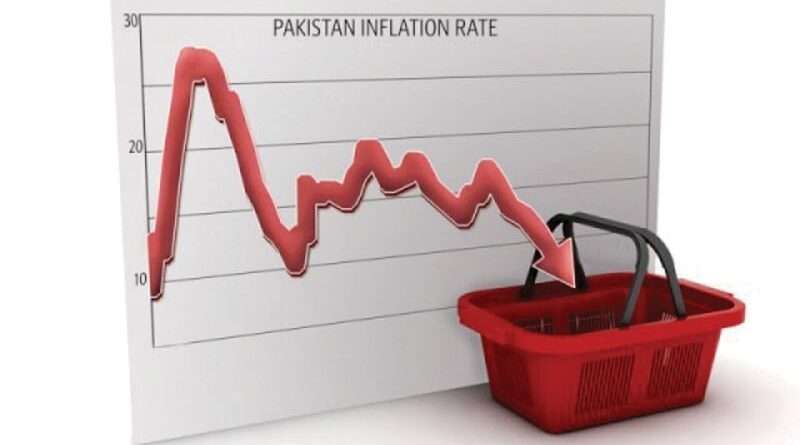Weekly Inflation Falls 0.03%: A Detailed Analysis of the Current Economic Climate
|
Getting your Trinity Audio player ready...
|
Introduction
In a significant shift from the previous four weeks, the short-term inflation in Pakistan, as measured by the Sensitive Price Indicator (SPI), decreased by 0.03% in the week ending November 28, 2024. This decline is primarily attributed to falling food prices. However, the year-on-year (YoY) inflation rate remains at a relatively low 5.13%, a trend that is expected to persist in the fiscal year 2024-25.
Understanding the Sensitive Price Indicator (SPI)
What is SPI?
The Sensitive Price Indicator (SPI) is a measure used by the Pakistan Bureau of Statistics (PBS) to track the prices of essential commodities on a weekly basis. It provides insights into the short-term inflationary trends affecting the economy.
Recent Trends in SPI
In the week ending November 28, 2024, the SPI recorded a marginal decline of 0.03%. This drop comes after a series of increases over the past month, indicating a slight easing in the cost of living for the average consumer.
Key Factors Influencing Inflation
Food Prices: The Primary Driver
Food prices have been a significant factor in the recent fluctuations in the SPI. Several key items have seen price reductions, contributing to the overall decline in inflation.
Decreases in Food Prices
- Chicken: Prices fell by 3.78%, bringing the cost down to Rs357.54 per kilogram.
- Tomatoes: A drop of 2.23% reduced the price to Rs186.05 per kilogram.
- Gram Pulse: Prices decreased by 1.60%, now costing Rs387.88 per kilogram.
- Masoor Pulse: Saw a reduction of 1.38%, with prices now at Rs301.60 per kilogram.
- Basmati Rice (Broken): Decreased by 1.15%, making the price Rs205.15 per kilogram.
Other Notable Decreases
- Gur: Prices fell by 0.59%.
- Mash Pulse: Reduced by 0.53%.
- Moong Pulse: Decreased by 0.25%.
Items with Price Increases
Despite the overall decline in inflation, some items have seen significant price increases, which are noteworthy.
Increases in Food Prices
- Potatoes: Prices rose by 3.34%, reaching Rs116.21 per kilogram.
- Garlic: Increased by 1.69%, now costing Rs677.85 per kilogram.
- Bananas: Saw a 1.13% increase, making the price Rs117.64 per dozen.
- Vegetable Ghee (2.5kg pack): Prices went up by 0.99%, now costing Rs1,382.57.
- Vegetable Ghee (1kg pack): Increased by 0.93%, reaching Rs557.58.
Other Notable Increases
- Mustard Oil: Prices rose by 0.91%.
- Cooking Oil (5-litre pack): Increased by 0.77%.
- Eggs: Saw a rise of 0.65%.
- Washing Soap: Increased by 0.53%.
- Liquefied Petroleum Gas (LPG): Prices went up by 0.20%.
Year-on-Year Inflation Analysis
Historical Context
The year-on-year inflation rate of 5.13% is notably low, hovering close to a six-year low. The last time inflation was this low was in April 2018, when it stood at 3.96%.
Expert Insights
Tahir Abbas, the Head of Research at Arif Habib Limited, provided his perspective on the current trends. He mentioned that the inflation rate is likely to remain stable, with slight increases expected in December and May 2025 due to the low base effect. Overall, inflation is projected to stay below 9% for the fiscal year 2024-25, with an average rate of 7.6%.
Policy Rate Adjustments
The State Bank of Pakistan (SBP) is anticipated to reduce its policy rate by 1.5 basis points, potentially lowering the rate to 12% by the end of the current fiscal year. This adjustment is aimed at fostering economic growth and controlling inflation.
Detailed Price Analysis
Weekly Price Movements
During the week under review, the prices of various essential items fluctuated. Out of 51 items monitored:
- Prices Increased: 12 items (23.53% weight)
- Prices Decreased: 9 items (17.65% weight)
- Prices Remained Stable: 30 items (58.82% weight)
Significant Year-on-Year Price Increases
The YoY inflation has been driven by notable increases in several commodities:
- Ladies’ Footwear: Prices surged by 75.09%, now costing Rs1,399.
- Gram Pulse: Increased by 66.40%, reaching Rs387.88 per kilogram.
- Tomatoes: Prices rose by 42.08%, now at Rs186.05 per kilogram.
- Moong Pulse: Saw a rise of 38.38%, making the price Rs385.05 per kilogram.
Implications for Consumers
Impact on Household Budgets
The fluctuations in essential commodity prices directly impact household budgets. While the decrease in certain food prices provides some relief, the increases in other items continue to strain finances.
Long-term Economic Stability
Maintaining a stable inflation rate is crucial for long-term economic stability. The expected policy rate adjustments by the SBP are a step in this direction, aiming to balance economic growth with inflation control.
FAQs
1. What is the Sensitive Price Indicator (SPI)?
The SPI is a measure used by the Pakistan Bureau of Statistics to track the prices of essential commodities on a weekly basis. It helps monitor short-term inflationary trends in the economy.
2. Why did the SPI decrease in the week ending November 28, 2024?
The SPI decreased by 0.03% due to a decline in the prices of several key food items, including chicken, tomatoes, and various pulses.
3. How does the year-on-year inflation rate compare to previous years?
The year-on-year inflation rate of 5.13% is close to a six-year low, last seen in April 2018. This indicates a relatively stable inflationary environment compared to previous years.
4. What items saw the most significant price increases in the recent SPI report?
Potatoes, garlic, and bananas saw significant price increases in the recent SPI report. Additionally, vegetable ghee, mustard oil, and cooking oil prices also rose.
5. How is the State Bank of Pakistan responding to current inflation trends?
The State Bank of Pakistan is expected to reduce its policy rate by 1.5 basis points, aiming to bring it down to 12% by the end of the current fiscal year. This move is intended to support economic growth and control inflation.
Conclusion
The slight decline in weekly inflation provides a glimmer of hope for consumers, though the economic environment remains challenging. With fluctuating prices of essential commodities and the expected policy rate adjustments, the coming months will be crucial in determining the overall economic stability of Pakistan
MUST READ:
https://skipper.pk/2024/11/30/shops-sales-drop-as-e-commerce-thrives/




